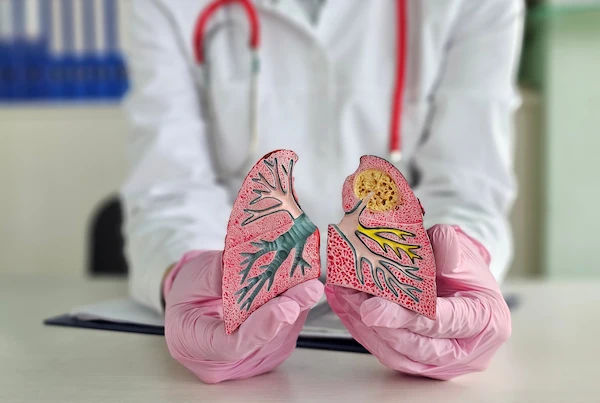Acute vs. Chronic Bronchitis
Understand the differences between acute and chronic bronchitis, including their causes, symptoms, and treatment options for effective management.

Written by Dr. Vasanthasree Nair
Reviewed by Dr. Rohinipriyanka Pondugula MBBS
Last updated on 13th Jan, 2026

Introduction
That persistent, nagging cough that keeps you up at night could be more than just a common cold. Often, it's a sign of bronchitis, a condition where the airways in your lungs become inflamed and produce excess mucus. But not all bronchitis is the same. Understanding the critical differences between acute bronchitis and chronic bronchitis is the first step toward effective treatment and recovery. This guide will break down everything you need to know, from identifying symptoms and causes to exploring treatment options and prevention strategies, empowering you to take control of your respiratory health.
What is Bronchitis? Understanding the Basics
At its core, bronchitis is the inflammation of the lining of your bronchial tubes. These are the vital pathways that carry air to and from your lungs. When these tubes are irritated or infected, they swell and produce thick mucus. This combination of swelling and mucus narrows the airways, triggering the hallmark symptom of bronchitis: a constant, often productive cough as your body tries to clear the obstruction.
The Role of Your Bronchial Tubes
- Imagine your respiratory system as an upside-down tree. Your windpipe (trachea) is the trunk, which splits into two main branches (the bronchi), one for each lung. These branches then divide into smaller and smaller twigs (bronchioles) throughout the lung tissue. Bronchitis specifically targets the main branches and their initial subdivisions, causing widespread inflammation that affects your entire breathing process.
Consult a Pulmonologist for the best advice
Acute Bronchitis: The Short-Term Infection
Often called a "chest cold," acute bronchitis is a very common, temporary condition. It typically develops from a viral infection, like the common cold or flu, and lasts for a few days to a few weeks. Most otherwise healthy people can recover at home without any specific medical treatment.
Primary Causes of Acute Bronchitis
- In about 90% of cases, acute bronchitis causes are viral. The same viruses that cause the common cold (rhinovirus) and influenza (flu virus) are the usual suspects. Less commonly, bacterial infections or exposure to irritants like tobacco smoke, dust, fumes, or air pollution can trigger an acute episode.
Key Symptoms of Acute Bronchitis
The symptoms of acute bronchitis are unmistakable:
- A persistent cough that may bring up clear, yellow, or green mucus.
- Chest discomfort or soreness from coughing.
- Fatigue and a general feeling of being unwell.
- Mild fever and chills.
- Shortness of breath (usually mild).
- Wheezing.
A unique insight often missed is the "post-viral cough" phenomenon. Even after the infection is gone, the bronchial tubes can remain inflamed and hypersensitive for weeks, causing a dry, lingering cough long after other symptoms have resolved.
How is Acute Bronchitis Diagnosed?
- Doctors typically diagnose acute bronchitis based on a physical exam and a review of your symptoms and medical history. They will use a stethoscope to listen for any abnormal sounds in your lungs, like crackling or wheezing. In most cases, no further testing is needed unless they suspect pneumonia or another complication.
Standard Treatment for Acute Bronchitis
Since it's usually viral, treatment for acute bronchitis focuses on symptom relief and supporting your body's natural healing process:
- Rest and Hydration: Your body needs energy to fight the virus. Drink plenty of fluids to thin mucus.
- Humidifiers or Steam: Moist air can help soothe irritated airways and loosen mucus.
- Over-the-Counter (OTC) Medicines: Cough suppressants can help with a dry, hacking cough, while expectorants can help loosen a productive cough. Pain relievers like ibuprofen can reduce fever and discomfort.
- Avoid Irritants: Especially tobacco smoke.
Important Note: Antibiotics are ineffective against viral infections. Their misuse for acute bronchitis contributes to antibiotic resistance.
Recovery Timeline and When to Worry
- Most people start feeling better within a week, though the cough can linger for 3+ weeks. If symptoms persist beyond two weeks, consult a doctor online with Apollo24|7 for further evaluation. Seek immediate medical attention if you experience a high fever, cough up blood, or have severe shortness of breath.
Chronic Bronchitis: A Long-Term Condition
Chronic bronchitis is a more serious, long-term condition and is a major subtype of Chronic Obstructive Pulmonary Disease (COPD). It's defined by a productive cough that occurs on most days for at least three months a year, for two consecutive years. It's a persistent state of inflammation and damage to the bronchial tubes.
Understanding COPD and Chronic Bronchitis
- Think of COPD as an umbrella term for lung diseases that cause breathing difficulties due to airflow blockage. Chronic bronchitis (airway inflammation and mucus) and emphysema (damage to air sacs) are the two main conditions under this umbrella. A person can have both.
Main Causes and Risk Factors
- The single biggest risk factor for chronic bronchitis is smoking. The toxic chemicals in cigarette smoke cause irreversible damage to the cilia (tiny hair-like structures that sweep mucus out of the airways) and lead to chronic inflammation. Other risk factors include long-term exposure to air pollution, chemical fumes, dust, and a history of severe respiratory infections.
Recognising the Symptoms of Chronic Bronchitis
The symptoms of chronic bronchitis are similar to acute bronchitis but are persistent and recurring:
- A daily, productive "smoker's cough."
- Frequent respiratory infections.
- Increasing shortness of breath, especially with physical activity.
- Wheezing and chest tightness.
- Fatigue and low energy levels.
- In advanced stages, bluish discolouration of the lips and skin (cyanosis) due to low oxygen.
How Doctors Diagnose Chronic Bronchitis
- Diagnosis involves a thorough review of your symptom history and smoking/exposure history. A key test is spirometry, a pulmonary function test where you blow into a machine to measure how much air you can exhale and how quickly. This assesses the degree of airflow obstruction. Chest X-rays or CT scans may also be used to rule out other conditions.
Managing and Treating Chronic Bronchitis
While the lung damage from chronic bronchitis is not reversible, chronic bronchitis treatment focuses on managing symptoms, slowing disease progression, and improving quality of life.
- Smoking Cessation: This is the absolute most critical step.
- Medications: Bronchodilator inhalers help open airways. Inhaled corticosteroids reduce inflammation. For frequent infections, doctors may prescribe antibiotics.
- Pulmonary Rehabilitation: A program of exercise, disease management training, and nutritional counseling.
- Oxygen Therapy: For those with severely low blood oxygen levels.
- Vaccinations: Annual flu shots and pneumococcal vaccines are essential to prevent complications.
Key Differences: Acute vs. Chronic Bronchitis
Understanding the key differences between acute and chronic bronchitis helps in proper treatment.
Prevention Strategies for Both Types of Bronchitis
You can significantly reduce your risk:
- Quit Smoking and Avoid Secondhand Smoke: This is the most powerful preventive measure.
- Get Vaccinated: The annual flu vaccine and pneumonia vaccine are crucial.
- Practice Good Hygiene: Wash your hands frequently to avoid viral infections.
- Wear a Mask: Protect your lungs from dust, chemical fumes, and air pollution when necessary.
- Strengthen Your Immune System: Eat a balanced diet, exercise regularly, and get enough sleep.
When to See a Doctor
It's important to seek professional medical advice if you experience:
- A cough that lasts more than three weeks.
- A fever higher than 100.4°F (38°C).
- Coughing up blood or discolored mucus.
- Shortness of breath or wheezing that interferes with sleep or daily activities.
- You have an underlying heart or lung condition like asthma, COPD, or heart failure.
Conclusion
Understanding the distinct paths of acute and chronic bronchitis is crucial for your health. That hacking cough after a cold is usually a self-limiting annoyance, but a daily, long-term cough is a red flag for a more serious condition like COPD. The common thread, however, is the profound impact of lifestyle choices, particularly smoking, on your respiratory well-being. By recognising the symptoms early, adopting preventive measures like vaccination and avoiding irritants, and seeking timely medical advice, you can protect your lungs and ensure every breath comes a little easier. If you're concerned about a persistent cough or breathing difficulties, don't hesitate to reach out to a healthcare professional for a personalised evaluation and treatment plan.
Consult a Pulmonologist for the best advice
Consult a Pulmonologist for the best advice

Dr. P Sravani
Pulmonology Respiratory Medicine Specialist
3 Years • MBBS, MD
Visakhapatnam
Apollo Clinic Vizag, Visakhapatnam

Dr Rakesh Bilagi
Pulmonology Respiratory Medicine Specialist
10 Years • MBBS MD PULMONOLOGIST
Bengaluru
Apollo Clinic, JP nagar, Bengaluru

Dr. E Prabhakar Sastry
General Physician/ Internal Medicine Specialist
40 Years • MD(Internal Medicine)
Manikonda Jagir
Apollo Clinic, Manikonda, Manikonda Jagir
(150+ Patients)

Dr. K Prasanna Kumar Reddy
Pulmonology Respiratory Medicine Specialist
16 Years • MBBS, DTCD (TB&CHEST), DNB (PULM MED), FCCP
Hyderabad
Apollo Medical Centre Kondapur, Hyderabad

Dr. Gomathi R G
Respiratory Medicine/ Covid Consult
7 Years • MBBS, MD (TB & Pul. Med.)
Chennai
Apollo First Med Hospitals P H Road, Chennai
Consult a Pulmonologist for the best advice

Dr. P Sravani
Pulmonology Respiratory Medicine Specialist
3 Years • MBBS, MD
Visakhapatnam
Apollo Clinic Vizag, Visakhapatnam

Dr Rakesh Bilagi
Pulmonology Respiratory Medicine Specialist
10 Years • MBBS MD PULMONOLOGIST
Bengaluru
Apollo Clinic, JP nagar, Bengaluru

Dr. E Prabhakar Sastry
General Physician/ Internal Medicine Specialist
40 Years • MD(Internal Medicine)
Manikonda Jagir
Apollo Clinic, Manikonda, Manikonda Jagir
(150+ Patients)

Dr. K Prasanna Kumar Reddy
Pulmonology Respiratory Medicine Specialist
16 Years • MBBS, DTCD (TB&CHEST), DNB (PULM MED), FCCP
Hyderabad
Apollo Medical Centre Kondapur, Hyderabad

Dr. Gomathi R G
Respiratory Medicine/ Covid Consult
7 Years • MBBS, MD (TB & Pul. Med.)
Chennai
Apollo First Med Hospitals P H Road, Chennai
More articles from Bronchitis
Frequently Asked Questions
Is bronchitis contagious?
Acute bronchitis, often caused by viruses, is contagious as the virus can spread through droplets in the air from coughing or sneezing. Chronic bronchitis itself is not contagious; it's a long-term condition caused by damage to the lungs.
How can I tell if my bronchitis is viral or bacterial?
It can be difficult to tell based on symptoms alone. Viral infections are far more common and are often accompanied by classic cold symptoms (sore throat, runny nose). Bacterial infections are rarer and may produce thicker, darker green mucus and more severe symptoms. A doctor can make the best determination.
What are the best home remedies for a bronchitis cough?
Staying well-hydrated is paramount. Using a humidifier, breathing in steam from a shower, gargling with salt water, and drinking warm liquids like tea with honey can help soothe the throat and loosen mucus.
Can bronchitis turn into pneumonia?
Yes, in some cases, the infection that causes bronchitis can spread deeper into the lungs and develop into pneumonia. This is more common in older adults, young children, and those with weakened immune systems. Watch for high fever, shaking chills, and significantly worsened shortness of breath.
What is the best sleeping position to relieve bronchitis symptoms?
Sleeping propped up with several pillows can help. This elevated position uses gravity to reduce post-nasal drip and ease coughing, making it easier to breathe and get rest.




